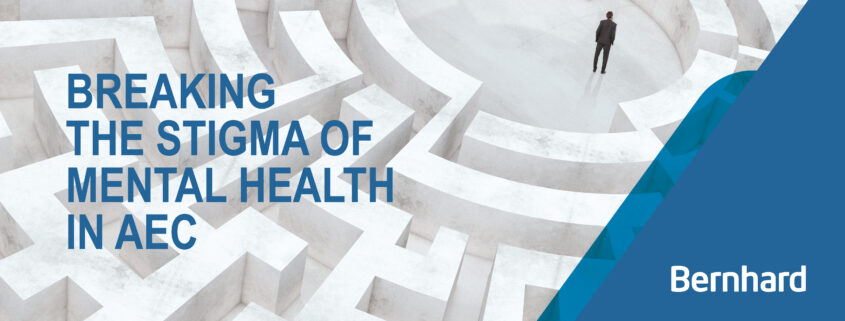Breaking the Stigma of Mental Health in AEC
________________
“It’s my problem, and I shouldn’t let it impact my job.”
“I don’t want my coworkers to believe they can’t count on me.”
“I can’t let the team down.”
Sound familiar? Workers who compartmentalize and leave “personal stuff” behind when they clock in every morning are as common in the Architecture, Engineering and Construction (AEC) industry as tool belts and hard hats. It’s easy to see why that culture developed. Pushing through physical discomfort, bad weather, late nights, and seemingly impossible schedules is oftentimes what it takes to get the job done. Why not emotional pain as well?
In AEC, those who can thrive under pressure and tight deadlines are highly prized. But when it comes to mental health, eventually something’s got to give. When workers take the stoic, project-first mentality that rules many job sites as an excuse to bottle up their emotions, neglect their own mental health, or discourage others from being honest and open about their personal challenges and struggles, it can come at a serious cost. Not just to projects, but to lives as well.
The truth is, AEC has a mental health problem, and staying silent about it is hurting our industry and the people who make it great. At Bernhard, we believe it’s long past time to tear down the stigma around talking about mental health.
According to the Centers for Disease Control, male workers in construction-related trades have the highest annual rate of suicide of any profession in the United States, with 49.4 suicides per 100,000 workers per year. That’s double the national average for all working men. Architecture and Engineering professions rank fifth, with 32.2 suicides per 100,000 workers per year.
Why is AEC so susceptible? Stress on the job, scheduling pressures, relationship issues due to time away from home, the toll some AEC careers can take on the body, and the AEC industry’s long-standing culture of suppressing emotions and devaluing mental health likely have a lot to do with it. Researchers are making strides to understand the true causes why.
One study of construction workers published in 2020 found that 83 percent reported experiencing what would be considered a moderate to severe mental health issue at some point in their lives. The same study found that up to 90 percent of those surveyed reported some form of early childhood trauma, while over 70 percent showed signs of undiagnosed PTSD.
Another recent study by the Institution of Mechanical Engineers found stress in the engineering field at what the organization called “crisis levels.” More than 67 percent said they had gone to work while feeling emotionally or mentally unwell, while 77.8 percent said their job is “often stressful.” More than half said their work has a negative effect on their mental health or sense of wellbeing.
The jury’s still out as to why AEC careers can take such a toll on the mental health of some workers. But at Bernhard, we’re not waiting around for definitive answers when the cost of waiting could be so great. From the boardroom to boots on the ground, Bernhard knows that devoting the time and resources it takes to care for workers’ mental health is absolutely part of getting the job done. We value teamwork and supporting each other’s mental health is just one aspect of being a team.
As an industry, we have to do more to find solutions to issues like depression, burnout, and suicide. That starts with breaking the taboo around talking about those topics, while encouraging those who are struggling to seek help. According to the American Psychiatric Association’s Center for Workplace Mental Health, the number one reason those in the construction industry who need help do not seek it is because of shame and stigma (78%) and fear of judgment by peers (77%). That’s why Bernhard is committed to offering some of the best mental-health support programs in our industry as part of a broader effort to strengthen workplace well-being through initiatives largely inspired by the Surgeon General’s Framework for Workplace Mental Health and Well-Being.
The first pillar of the Framework, Protection from Harm, centers around fostering both physical and psychological safety, which rests on two human needs: safety and security. Safety relates to protection from physical and non-physical harm, including injury, illness, discrimination, bullying, and harassment. Security ensures all workers feel secure financially and in their job future. Key components of Bernhard’s strategy to address Protection from Harm include the following:
- Prioritize workplace physical and psychological safety. Safety is a core value at Bernhard, with safety being incentivized, celebrated, and engrained into all work environments. We have an industry-leading safety training program geared to maintain a safe and healthy work environment, safeguard all persons who enter, work, or live near our job sites, and meet or exceed regulatory standards.
Studies show that employees struggling with mental health issues are twice as likely to be distracted on the job. Depression and anxiety paired with long workdays can contribute to a lack of sleep. This dangerous combination of exhaustion and mental absenteeism can lead to more mistakes, which increases the likelihood of accidents and injuries. In acknowledgement of this, Bernhard recognizes that no safety program is complete without elements that support employee’s mental health.
- Normalize and support mental health. Bernhard’s EmployeeConnect is a completely free, totally confidential service for Bernhard employees and their families. Whether employees are dealing with depression, substance abuse, money troubles, job-related stress, or even thoughts of suicide, EmployeeConnect can help. By providing free counseling, 24/7 support, online resources, and even access to specialists like lawyers and financial counselors who can help make sense of legal or financial issues, EmployeeConnect can be a lifeline in a sea of troubles.
- Operationalize DE&I norms, policies, and programs. In inclusive workplace cultures, all employees welcome and value each other’s unique perspectives. When diversity is celebrated as a source of strength, workers experience less stress and anxiety as bias and prejudice are not tolerated. Inclusive leadership is vital for fostering DE&I among teams and is required to support a work environment where all team members feel valued and represented, an outcome Bernhard is fully committed to and actively working towards achieving.
Nearly everybody in AEC has had to set aside their emotions or personal struggles from time to time to deliver for the customer. But when you try to keep a tight lid on something that’s been bothering you for days, weeks, or months, it’s eventually going to boil over and impact other areas of your life, despite your best efforts. Emotional turmoil like financial worry, anxiety, grief, or family problems can affect your sleep, your relationships at home, your friendships, and your ability to focus on safety for yourself and your team.
Seeking help for those challenges doesn’t mean you’re weak. It just means you understand that keeping yourself healthy and strong is part of making sure you’re ready to deliver for your team when the going gets tough – and that has to include taking care of your mental health as well.



